THRIVING WITH CANCER
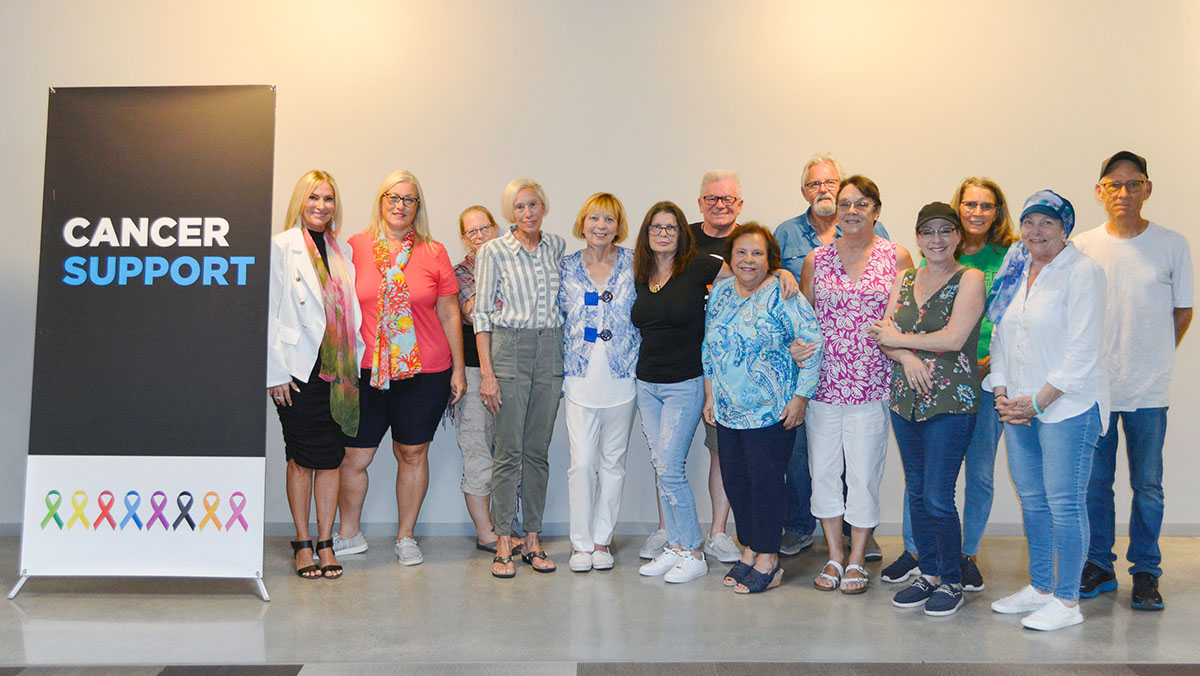
Support group takes multi-disciplinary approach
BY ELLEN GILLETTE
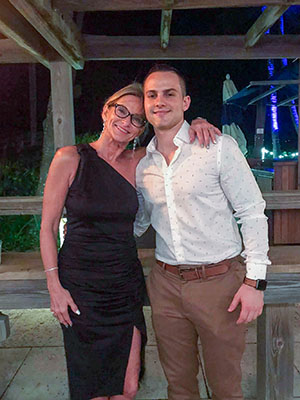
but Lisa Tarentino was fortunate to have her son, C.J., by her side when she
underwent numerous sessions of chemotherapy.
When Lisa Tarantino was diagnosed with stage III endometrial cancer, she dove into treatment with a positive mindset, intent on survival. She endured six surgeries accompanied by six months of aggressive chemotherapy.
Tarantino’s son, C.J., went along, not only for support and company, but also to help with what is called “cold capping.” More than half of all chemo patients lose their hair, but with cold capping, a series of dry ice-cooled caps that cause blood vessels in the scalp to narrow, the amount of harsh chemicals reaching hair follicles is reduced.
“Cold capping’s becoming more popular,’’ Tarantino says. “I only lost about 20% of the hair framing my face but it grew back in nicely.”
Tarantino was grateful for her son’s presence during the six-hour sessions. “It’s common for patients to be alone,” she says. “It’s a long day. No one wants to ask someone to sit there for four, five, six hours. Not everyone can handle it but it tugged at my heart to see others without anyone. My son would kid me: ‘Do you have to talk to everybody?’”
After scheduling Tarantino for radiation, her doctors told her that due to a genetic predisposition to a low white blood cell count, she was ineligible.
Rather than giving up, however, she broadened her research.
“The medical community helped save my life,” she says, “but I realized that it was up to me to continue my healing. I work at it every day. I have to.”
BOOSTING IMMUNE SYSTEM
The human body’s immune system is designed to fight off disease and keep it healthy. Cancer treatment can actually damage the system. As Tarantino attended multiple cancer support groups from Stuart to West Palm Beach and studied everything she could find on the subject, she learned about the importance of non-medical boosts to the immune system such as exercise and nutrition.
Tarantino was especially drawn to the New York-based Radical Remission Project, launched by Kelly Turner, PhD. After studying more than 1,500 cancer patients worldwide who experienced a radical, unexpected remission, Turner isolated 10 universally common factors: self-empowerment, deepening spiritual connections, an increase in positive emotions, following personal intuition, releasing suppressed emotions, diet changes, herbs and supplements, developing a strong reason for living, joy and happiness, and increasing social support.
Tarantino’s health improved as she focused on the 10 factors; a passion grew to share with others ways they could also benefit. She became a certified functional nutrition counselor, a full body systems graduate, a radical remission hope coach, a holistic cancer coach and a member of the health navigator community.
Tarantino, a caregiver for her husband, Charles, a disabled Vietnam veteran and fellow cancer survivor, began her own business. Tarantino Coaching and Wellness enabled her to work one-on-one and with groups for classes and workshops. Business was one thing — she also longed for a cancer support group for patients and their families in her own backyard.
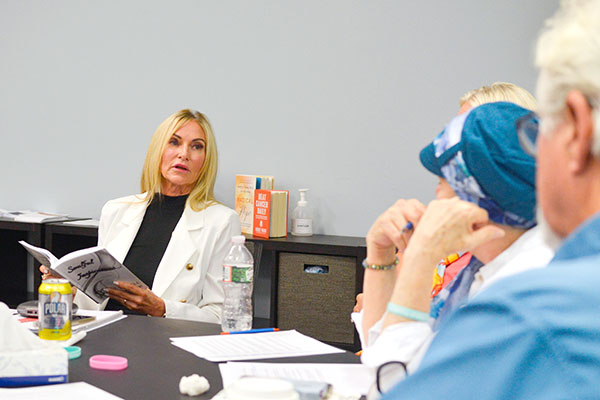
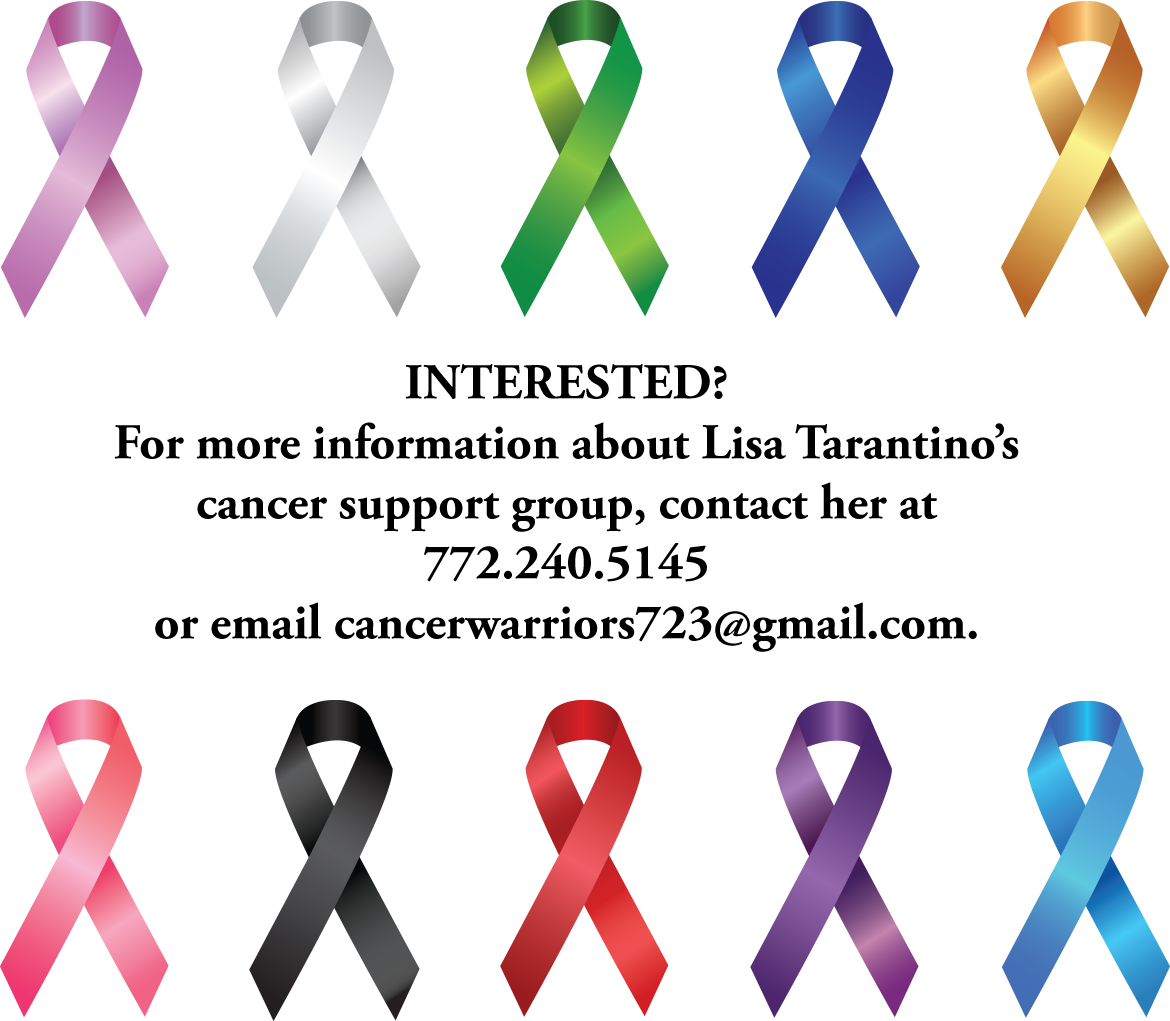
HOME-GROWN SUPPORT
Four and a half years ago, a friend invited Tarantino to a Bible study at Christ Fellowship Church in Tradition, where support groups for a variety of issues — substance abuse, divorce and grief — were offered. She approached the care pastor about a meeting for cancer support. “He said he’d always wanted one, but there wasn’t anyone to facilitate.”
Tarantino volunteered and “absolutely fell in love” with the community that meets Tuesday evenings at 6:30 in Room 213. There is no charge for attendance but when off-site workshops are offered as part of Tarantino’s business, support group members receive a discount.
“During the pandemic, we moved to Zoom but now we’re hybrid — Zoom and in-person,” Tarantino says. “If someone isn’t feeling well after chemo or they’re out of state, they can still participate. I [started the group] to help others, but it blesses me. I’m so proud of the way the group embraces new members. They’ve become a family.”
Relating to people who understand one’s circumstances and share similar challenges is key to social support. Cancer patients often experience alienation and isolation, adding another layer of trauma.
Group member Bonnie Gallucci is a former Air Force nurse. She remembers when doctors made house calls and would touch her on the shoulder, telling her that everything was going to be OK. “People have forgotten how important that human connection is. That’s what we give people here: comfort and compassionate care.”
After the group recently watched a video on the science behind the mind-body connection, one woman shared about realizing what she was missing. While her family told her what she should or shouldn’t be doing, they’d stopped hugging her. As if cancer could be “caught.”
As other members of the group laid a hand on her shoulder, she determined to speak up about what she needed at home.
Gallucci says that people who haven’t experienced cancer mean well, but don’t always know how to respond — unlike the group. “I can be down, then come to a meeting and walk out feeling so much better.”
Kelly McIntosh-Kraft and her husband, John, attend the group together and have learned to manage their cancers. “I’m off 22 different medications because of the way I eat now,” McIntosh-Kraft says. Massaging John’s back with essential oils has “made a huge difference” for his respiratory condition.
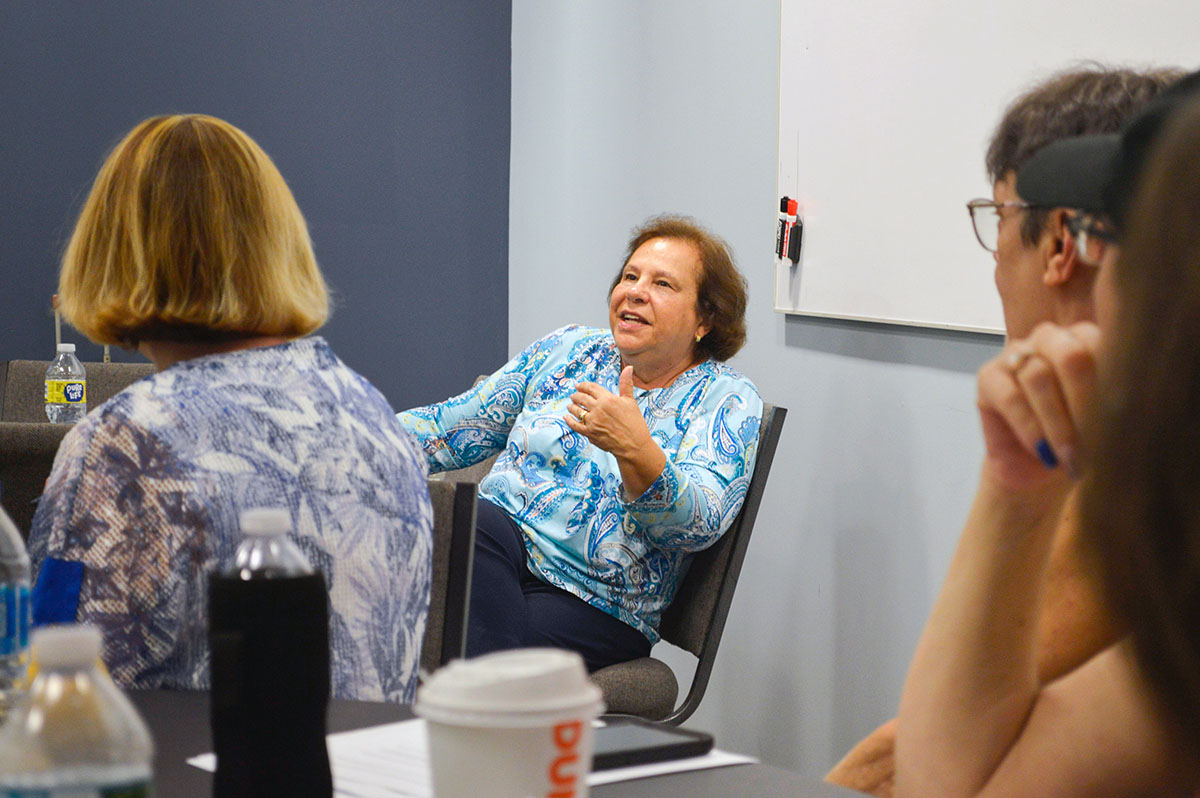
LEARNING AS A GROUP

Meetings can get intense, Tarantino admits. “We’ve lost members. It can get emotional but we do a good job banding together.”
Visitors may show up full of fear and questions. Recently a young woman, at the building for another meeting, saw the cancer support group sign and wandered in, close to tears. Her mother had just been diagnosed with mesothelioma. When a man in the group shared about his own mesothelioma diagnosis, it gave her hope. Others in the group offered encouragement and suggestions based on their knowledge and experience.
Weekly attendance for the support group varies, but there are about 25 regulars with a private dedicated Facebook group [Faithful Thrivers] that provides daily connection. Caretakers and family members are welcome, as are people of all faiths and backgrounds.
“We never turn anyone away,” Tarantino says. “This is a confidential safe space.”
Guest speakers may include medical professionals or a healing testimony. Videos related to cancer are followed by discussion. Special events are planned. Periodic “processing meetings” involve sharing more personal topics.
Tarantino often focuses on a particular aspect of boosting the immune system such as increasing positivity. “When I was first diagnosed,” she says, “I went on Facebook and saw so much negativity, I started deleting people. You have to be your own advocate, make changes, set boundaries.”
When co-leader Camille Vigrass was diagnosed with the same cancer that killed her mother when she was a child, she focused on healing. “Back then, there was no real treatment, no radiation. Even now, people are diagnosed and they either think ‘I’m done’ or they go the other way. What we do here is for others. It’s a room of hope and courage.”
See the original article in print publication
Sept. 2023
